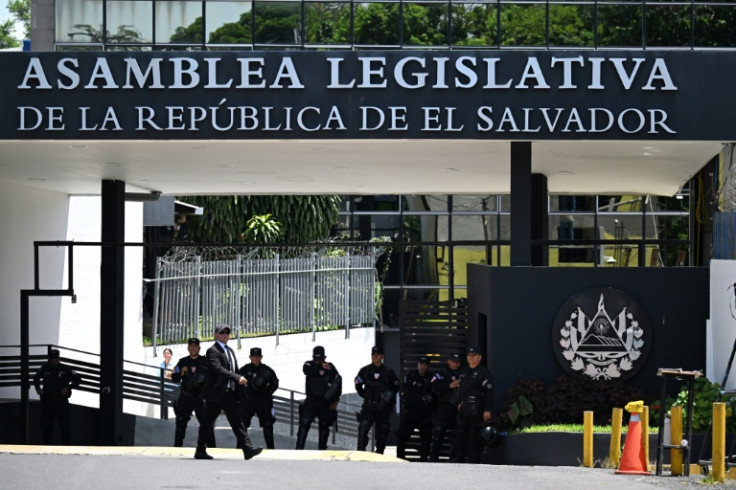El Salvador Extends Detention Of Suspected Gang Members

Tens of thousands of suspected gang members arrested under an internationally criticized crackdown in El Salvador will be detained without trial until at least 2027, after lawmakers approved an extension Friday.
Over 80,000 Salvadorans have been detained -- some of whom opposition figures and human rights defenders maintain are innocent -- since gang-busting President Nayib Bukele declared a state of emergency in 2022 that allowed arrests without warrants.
The Legislative Assembly, which has 57 members of Bukele's ruling party and three from the opposition, approved on Friday a reform to a law regulating investigations into organized crime.
The approval came just 10 days before a two-year deadline ran out for charges to be filed for the imprisoned detainees.
The government accuses the detainees all of being gang members, but with scant evidence or due process, no one knows for sure.
One of the provisions of the reform said the Attorney General's office "will bring charges against the organized crime and its members... within a maximum period of 24 months," while also allowing for a 12-month extension.
To file the charges, the Attorney General's office will "group the defendants into a single case" for each gang, with the main ones under scrutiny being the Barrio 18 and Mara Salvatrucha (MS-13) gangs.
Around 300 prosecutors will present evidence in roughly 600 mass trials for the suspects, Attorney General Rodolfo Delgado told a congressional security committee on Thursday.
Delgado said the trials will be divided by the organization, where they operated, or what crimes the detainees are suspected of committing.
Inside the assembly, opposition lawmaker Francisco Lira warned that "innocent" people could be tried in the mass trials, which he estimated could be "40 percent" of those detained.
"I do not defend gangs, criminals, nor extortionists (but) if there are innocent people, they are being sentenced to spend more time in prison" due to the delays, Lira said.
Under the reforms, the mass trials will remain open if more defendants are added to the same case -- but if no new defendants are added within two years, the judge may issue a ruling.
If prosecutors do not file an indictment within a maximum period of three years, the judge may dismiss the case.
Opposition lawmaker Claudia Ortiz said the reforms are "a reflection of the lack of capacity possessed by the institutions that are supposed to administer justice in our country."
"Because in more than two years they have not done what they are supposed to do... which is fully investigate the facts," she added.
Bukele's hardline approach to El Salvador's powerful gangs has made him one of the world's most domestically popular leaders, even as human rights defenders sound the alarm over arbitrary arrests and growing authoritarianism.
© Copyright AFP {{Year}}. All rights reserved.





















